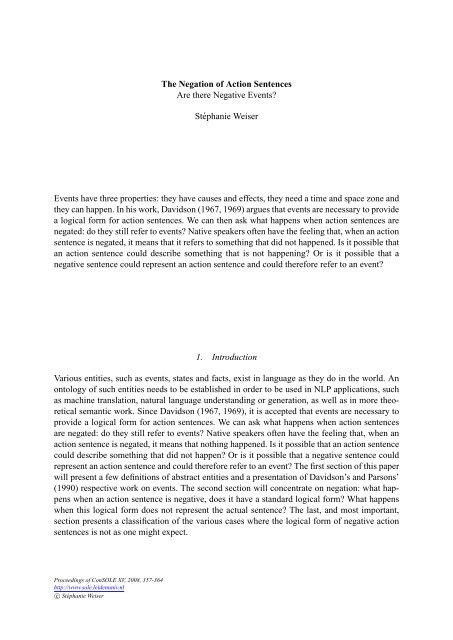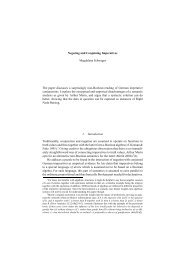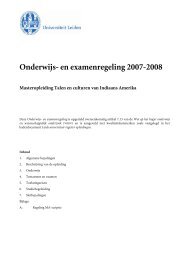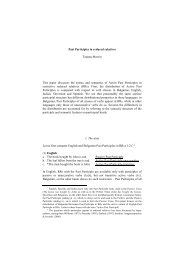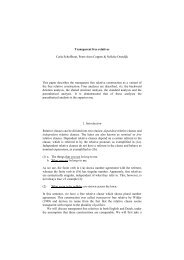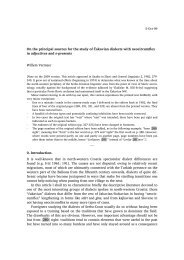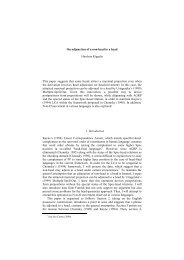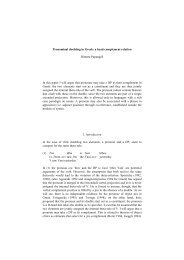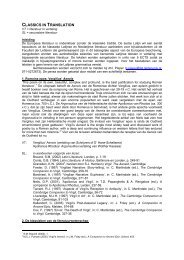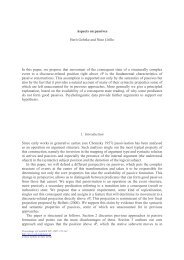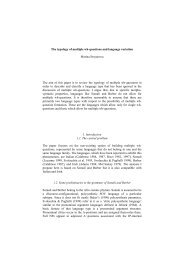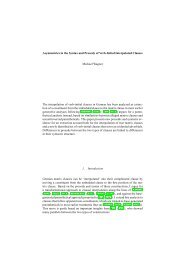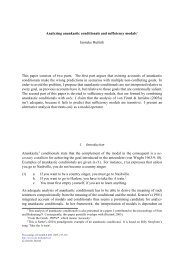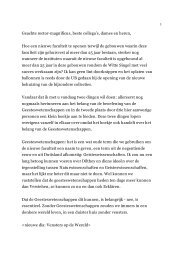The Negation of Action Sentences Are there Negative Events ...
The Negation of Action Sentences Are there Negative Events ...
The Negation of Action Sentences Are there Negative Events ...
You also want an ePaper? Increase the reach of your titles
YUMPU automatically turns print PDFs into web optimized ePapers that Google loves.
<strong>The</strong> <strong>Negation</strong> <strong>of</strong> <strong>Action</strong> <strong>Sentences</strong><br />
<strong>Are</strong> <strong>there</strong> <strong>Negative</strong> <strong>Events</strong>?<br />
Stéphanie Weiser<br />
<strong>Events</strong> have three properties: they have causes and effects, they need a time and space zone and<br />
they can happen. In his work, Davidson (1967, 1969) argues that events are necessary to provide<br />
a logical form for action sentences. We can then ask what happens when action sentences are<br />
negated: do they still refer to events? Native speakers <strong>of</strong>ten have the feeling that, when an action<br />
sentence is negated, it means that it refers to something that did not happened. Is it possible that<br />
an action sentence could describe something that is not happening? Or is it possible that a<br />
negative sentence could represent an action sentence and could <strong>there</strong>fore refer to an event?<br />
1. Introduction<br />
Various entities, such as events, states and facts, exist in language as they do in the world. An<br />
ontology <strong>of</strong> such entities needs to be established in order to be used in NLP applications, such<br />
as machine translation, natural language understanding or generation, as well as in more theoretical<br />
semantic work. Since Davidson (1967, 1969), it is accepted that events are necessary to<br />
provide a logical form for action sentences. We can ask what happens when action sentences<br />
are negated: do they still refer to events? Native speakers <strong>of</strong>ten have the feeling that, when an<br />
action sentence is negated, it means that nothing happened. Is it possible that an action sentence<br />
could describe something that did not happen? Or is it possible that a negative sentence could<br />
represent an action sentence and could <strong>there</strong>fore refer to an event? <strong>The</strong> first section <strong>of</strong> this paper<br />
will present a few definitions <strong>of</strong> abstract entities and a presentation <strong>of</strong> Davidson’s and Parsons’<br />
(1990) respective work on events. <strong>The</strong> second section will concentrate on negation: what happens<br />
when an action sentence is negative, does it have a standard logical form? What happens<br />
when this logical form does not represent the actual sentence? <strong>The</strong> last, and most important,<br />
section presents a classification <strong>of</strong> the various cases where the logical form <strong>of</strong> negative action<br />
sentences is not as one might expect.<br />
Proceedings <strong>of</strong> ConSOLE XV, 2008, 357-364<br />
http://www.sole.leidenuniv.nl<br />
c○ Stéphanie Weiser
358 Stéphanie Weiser<br />
2. Abstract Entities<br />
2.1. Useful Definitions<br />
According to Parsons’ ontology, <strong>there</strong> are three main types <strong>of</strong> entity: events, states and facts.<br />
On one hand we have events and states, which are eventualities (along with processes) and on<br />
the other hand we have facts, which are propositional. <strong>Events</strong> have three properties: they have<br />
a spatio-temporal localisation, they have causes and effects, and they can happen, or culminate.<br />
States also last for a certain period <strong>of</strong> time but do not have a culmination point. Lastly, facts are<br />
propositional and have the property <strong>of</strong> always being true.<br />
2.2. Davidson’s representation <strong>of</strong> action sentences<br />
Davidson’s work has been very influential in the field <strong>of</strong> philosophy <strong>of</strong> language. He suggested<br />
that the logical form <strong>of</strong> a sentence needs to include enough information to be consistent. From<br />
Davidson’s point <strong>of</strong> view, every action verb has an argument position reserved for an event. This<br />
event is necessary to build the logical form, in which it needs to be existentially quantified.<br />
(1) Brutus stabbed Caesar<br />
Ignoring verb tense, this sentence would have the following logical form:<br />
(2) ∃e stab (Brutus, Caesar, e)<br />
For the first time, the original sentence does not appear in the logical form.<br />
2.3. Parsons’ logical form<br />
<strong>The</strong> logical form suggested by Parsons is a lot more detailed than Davidson’s. It is a paraphrase:<br />
<strong>there</strong> is an event about which we can say as many things as we want.<br />
(3) Brutus stabbed Caesar<br />
(4) For some event e, e is a stabbing, and the agent <strong>of</strong> e is Brutus, and the object <strong>of</strong> e is<br />
Caesar, and e culminated at some time in the past.<br />
In Parsons’ theory, verbs are similar to nouns: each common noun refers to a kind <strong>of</strong> object<br />
(and not to a particular object) and each verb refers to a kind <strong>of</strong> action or state. Parsons’ logical<br />
form has an advantage: it makes predictions possible. For example, from Parsons’ logical form,<br />
it is possible to predict Mary runs from Mary runs slowly. Parsons’ and Davidson’s founding<br />
works have been very influential and they have formed the base for all further work on event<br />
representation. Davidson’s representation has been adopted here because it was more convenient<br />
for this work but we should not forget that Parsons’ view could be considered more complete<br />
and, <strong>there</strong>fore, his ontology has been used.
<strong>The</strong> <strong>Negation</strong> <strong>of</strong> <strong>Action</strong> <strong>Sentences</strong> 359<br />
3. <strong>Negation</strong> <strong>of</strong> action sentences<br />
3.1. Expected Logical Form<br />
According to Davidson’s representation, the logical form <strong>of</strong> a standard action sentence begins<br />
with ∃e, we might expect the logical form <strong>of</strong> a negated action sentence to start with ¬∃e.<br />
(5) Paul laughed<br />
Ignoring verb tense, a sentence like this one would have a logical form like:<br />
(6) ∃e laugh(Paul, e)<br />
For negative sentences, it would work as follow:<br />
(7) Paul did not laugh<br />
(8) ¬∃e laugh(Paul, e)<br />
This logical form works with more complicated examples as well, like:<br />
(9) John won the chess game<br />
(10) He did not win the chess game.<br />
But it is incompatible with a number <strong>of</strong> properties <strong>of</strong> negated sentences.<br />
3.2. Objection to this Logical Form<br />
Following the expected logical form, negative sentences never refer to events. But after studying<br />
negated sentences, it was found that they can have the same properties as positive action sentences.<br />
This is why we can not accept the expected logical form every time. <strong>The</strong> three properties<br />
which typify events can also be found in some negated action sentences. <strong>The</strong>se negated action<br />
sentences can have causes and effects.<br />
(11) John fell out <strong>of</strong> the tree because [he did not go to school]<br />
In this sentence, he did not go to school can be understood as the cause <strong>of</strong> the first part John<br />
fell out <strong>of</strong> the tree. We could object to this argument by poitning out that even if because is a<br />
linguistic mark <strong>of</strong> causality, it does not necessarily imply a causal relation in the world. But<br />
here, we can assume that if John had gone to school, he would not have been in a tree. <strong>Negative</strong><br />
sentences can also describe something that happens:<br />
(12) John did not come to school, it happened yesterday.<br />
Finally, they may express a location in time and space:<br />
(13) Yesterday, John did not go to school.
360 Stéphanie Weiser<br />
We have thus seen that a single negative action sentence John did not go to school, may possess<br />
the three properties <strong>of</strong> events that we exposed earlier. This provides a basis on which to reject<br />
the standard logical form <strong>of</strong> negative sentences, in which events do not exist.<br />
4. Classification<br />
Departing from the work on events and/or negation by De Swart and Molendijk (1999),<br />
Przepiórkowski (1999), Amsili & Le Draoulec (1998) or Cooper, an attempt has been made<br />
to identify which negated action sentences could not be given the expected logical form. After<br />
studying these sentences, they have been classified into four classes, which are presented here.<br />
Many <strong>of</strong> the examples used come from Przepiórkowski (1999) but they are not necessarily his<br />
own.<br />
4.1. Factual Discourse Referent<br />
It is a general assumption that the pronoun it may be used to refer to an event. This assumption<br />
is validated by the fact that it can be placed in an event container (a predicative context<br />
subcategorising an event in argument position):<br />
(14) [John did not stop at the gas station], it happened yesterday.<br />
We could then assume that John did not stop at the gas station involves an event. But is it still<br />
clear in the following example?<br />
(15) [John did not stop at the gas station], it surprised Mary.<br />
It is not certain that the verb surprise requires an event subject.<br />
(16) <strong>The</strong> color <strong>of</strong> the car surprised Mary.<br />
In this sentence, it is obvious that the color <strong>of</strong> the car does not correspond to an event but it may<br />
be factual, propositional. We can make the same observation for other sentences:<br />
(17) John did not kiss Mary, which made her angry.<br />
John did not kiss Mary may not refer to an event since it can not be placed in an event container:<br />
(18) *John did not kiss Mary, it happened yesterday.<br />
<strong>The</strong> situation is the same in sentences with durative complements:<br />
(19) After John did not arrive on the 10 o’clock train, Eva left the train station.<br />
<strong>The</strong>se sentences do not refer to events, but to facts, to situations which can be perceived.
<strong>The</strong> <strong>Negation</strong> <strong>of</strong> <strong>Action</strong> <strong>Sentences</strong> 361<br />
4.2. Positive Equivalent <strong>Sentences</strong><br />
It is commonly assumed that when a perception verb is followed by an infinitive, it refers to an<br />
event. This would then be the case in Higginbotham’s (1983) famous example :<br />
(20) I saw John not stop at the red light.<br />
But these sentences are rare and <strong>of</strong>ten unnatural:<br />
(21) ?I saw Mary not knit.<br />
It may be suggested that this kind <strong>of</strong> negative sentence is natural when <strong>there</strong> is an equivalent<br />
positive sentence. Instead <strong>of</strong> I saw John not stop at the red light, we could easily say I saw<br />
John cross the road. It is more difficult to find a matching positive sentence for not knit. Not<br />
close would correspond to leave open, not give to keep, and so on. We observe that the negative<br />
sentences which have a positive equivalent can be placed in an event container:<br />
(22) What happened is that John did not stop at the red light.<br />
It is more difficult for the sentences that do not have this equivalent:<br />
(23) *What happened is that Mary did not knit.<br />
<strong>Negative</strong> sentences with a positive equivalent may also have causes and effects, which is not the<br />
case for the other sentences:<br />
(24) John had an accident because he did not stop at the red light.<br />
It is hard to find a sentence in which Mary did not knit would have a cause or consequence. It<br />
may <strong>there</strong>fore be concluded that when a negative sentence has a positive equivalent sentence,<br />
the latter refers to a standard - positive - event. <strong>The</strong> problem is that the speaker’s intuition is<br />
necessary to identify these sentences, which makes them hard to process automatically.<br />
(25) Often, John has not paid his taxes.<br />
4.3. Temporal Quantification<br />
<strong>Sentences</strong> like this one seem to refer to an event and reveal the breaking <strong>of</strong> a habit: usually,<br />
John does pay his taxes, we expect him to do so. But it is hard to establish the logical form<br />
corresponding.<br />
(26) ¬ <strong>of</strong>ten (∃e pay (John, taxes, e))<br />
(27) <strong>of</strong>ten (∃e¬pay (John, taxes, e))<br />
In the first logical form proposed here, the negation has a wide scope: <strong>there</strong> are not a lot <strong>of</strong><br />
occasions where John pays his taxes. But in this logical form <strong>there</strong> seems to be an event <strong>of</strong> John<br />
paying his taxes. In the second logical form, it is the adverb that has a wide scope but we can
362 Stéphanie Weiser<br />
understand it as <strong>of</strong>ten, <strong>there</strong> is an event such as John is not paying his taxes. We need to account<br />
for the relations between temporal adverbs and negation. To understand that the sentence refers<br />
to the breaking <strong>of</strong> a habit, we <strong>of</strong>ten need the context:<br />
(28) Mary did not turn <strong>of</strong>f the stove.<br />
In this example (Partee), it does not mean that she never did it. It could mean that she did not<br />
the last time she left the kitchen: <strong>there</strong> is no event <strong>of</strong> Mary turning <strong>of</strong>f the stove for a certain<br />
period <strong>of</strong> time. We can make similar observations with cardinal adverbs:<br />
(29) Twice, he did not laugh<br />
Does twice mean that <strong>there</strong> are two events or two periods <strong>of</strong> time? I noticed that <strong>there</strong> is no good<br />
logical form for this kind <strong>of</strong> sentence. <strong>The</strong> need seems apparent for a theory accounting for the<br />
interaction between time, aspect and negation. De Swart (1996) tried to establish such a theory<br />
but it is very complicated and will not be explored here.<br />
(30) <strong>The</strong> non-explosion - the invalidation<br />
4.4. <strong>Negative</strong> Substantive<br />
<strong>The</strong>se words (from Higginbotham 1983) are negative substantives and may be the closest thing<br />
to negative events. <strong>The</strong>y do not involve a phrasal negation, but a noun that is negated. This noun<br />
could refer to an event, since it can be placed in an event container:<br />
(31) <strong>The</strong> non-explosion <strong>of</strong> the gases happened yesterday in public.<br />
This sentence could seem unnatural but it is not so hard to find a context in which it is not:<br />
(32) <strong>The</strong> chemists try to mix two gases but they explode every time. Yesterday the nonexplosion<br />
<strong>of</strong> the gases happened after all.<br />
This morphological negation is restrained: it is the non-explosion and not the no-explosion,<br />
invalidation and not devalidation and so on. <strong>The</strong> discourse referent <strong>of</strong> this kind <strong>of</strong> sentence is<br />
thus an event. <strong>The</strong>re is no problem with regards to logical form since the negation is included<br />
in the noun, the logical form can start with ∃e. <strong>The</strong> only thing to keep in mind is that not all the<br />
verbs have equivalent negative substantives, so this can not be generalized.<br />
4.5. Summary<br />
<strong>The</strong> cases in which the logical form <strong>of</strong> a negative action sentence is not the expected form (¬∃e)<br />
have been classified into four classes. Firstly, a negative action sentence can provide a factual<br />
discourse referent instead <strong>of</strong> an event. For the sentence John did not arrive, it surprised Mary,<br />
to be consistent, the first proposition John did not arrive needs to be true. If we can say <strong>of</strong> a<br />
sentence that it is true, then it means that it refers to a fact. Here, the pronoun it refers to a fact
<strong>The</strong> <strong>Negation</strong> <strong>of</strong> <strong>Action</strong> <strong>Sentences</strong> 363<br />
and not to an event. This fact is expressed by the negative sentence. Secondly, some negative<br />
sentences can be understood thanks to their positive equivalent action sentence: we refer to a<br />
standard, positive event but we express it with a negative sentence. When we say Paul did not<br />
stop at the red light, we picture him driving across the intersection, and this is clearly an event.<br />
Thirdly, when <strong>there</strong> is a quantification over time, it is hard to establish a correct logical form.<br />
We need a new theory accounting for the interactions between time, aspect and negation. This<br />
theory could handle sentences like Often, he has not paid his taxes. Last, when the negation is<br />
morphological and concerning the noun, the discourse referent which is made available is an<br />
event but the sentence is not negative. <strong>The</strong>re is no problem with the standard logical form ∃e.<br />
5. Conclusion<br />
In order to improve on this work, one <strong>of</strong> the first steps would be to try to establish a complete<br />
theory <strong>of</strong> the interaction between tense, aspect and negation. It would be interesting to study<br />
more carefully the notion <strong>of</strong> event containers and what happens when <strong>there</strong> is a negation in such<br />
a container. This work could be useful in NLP applications such as text generation and machine<br />
translation. It could be enlarged to other entities and maybe integrated in DRT. It is naturally<br />
assumed that negation is posterior to affirmation. But a psycho-linguistic study showed that<br />
negative sentences do not take more time to be produced than positive ones. It could <strong>there</strong>fore be<br />
suggested that negation is not an operator but that it is at the same level as positive productions.<br />
Another lead to follow is the effect <strong>of</strong> neg-raising, which has been mentioned by Horn. In some<br />
sentences, the negation may not be informative but purely pragmatic, which explains why it<br />
may be moved by a neg-raising phenomenon. A similar idea, that <strong>of</strong> the positive equivalent<br />
sentence, has been evoked here, but it may be applied to temporal quantification as well: Mary<br />
usually turns <strong>of</strong>f the stove, but not this time... It can <strong>there</strong>fore be concluded that the logical form<br />
<strong>of</strong> negated sentences is ¬∃e except in some cases, which are very disparate.<br />
Acknowledgements<br />
I am grateful to Pascal Amsili for his help during the preparation <strong>of</strong> the conference. I would<br />
like to thank the audience <strong>of</strong> Console XV for their questions and useful comments. Thanks to<br />
the conference organizers and especially Sylvia Blaho for her L A TEX help. Finally I thank André<br />
Bittar for having corrected the English in the first version <strong>of</strong> this paper.<br />
Stéphanie Weiser University Paris X Nanterre - Laboratoire MoDyCo sweiser@u-paris10.fr<br />
References<br />
Amsili, P., Le Draoulec, A. (1998) An account <strong>of</strong> negated sentences in the DRT Framework. <strong>The</strong> Tbilisi Symposium<br />
on Language, Logic and Computation: Selected Papers, Ginzburg, Khasidashvili, Vogel, Levy and Vallduv eds),<br />
CSLI Publications.<br />
Davidson, D. (1967) <strong>The</strong> Logical Form <strong>of</strong> <strong>Action</strong> <strong>Sentences</strong>, in N. Rescher ed. (1967), pp. 81-95.
364 Stéphanie Weiser<br />
Davidson, D. (1969) <strong>The</strong> Individuation <strong>of</strong> <strong>Events</strong>, in N. Rescher, ed., Essays in Honor <strong>of</strong> Carl G. Hempel, Dordrecht:<br />
Reidel, pp. 216-34.<br />
Higginbotham, J. (1983) <strong>The</strong> Logic <strong>of</strong> Perceptual Reports: An Extensional Alternative to Situation Semantics, <strong>The</strong><br />
Journal <strong>of</strong> Philosophy 80, pp. 100-27.<br />
Parsons, T. (1990) <strong>Events</strong> in the Semantics <strong>of</strong> English. A Study in Subatomic Semantics, Cambridge, MA, and<br />
London, MIT Press, pp. 3-39 - pp. 127-142.<br />
Przepiórkowski, A. (1999) On <strong>Negative</strong> Eventualities, <strong>Negative</strong> Concord and <strong>Negative</strong> Yes/No Questions, in<br />
Matthews, T. and Strolovitch, D. (eds.) Proceedings <strong>of</strong> Semantics and Linguistic <strong>The</strong>ory 9 (SALT 9), Ithaca,<br />
NY, CLC Publications.<br />
de Swart, H. (1996) Meaning and use <strong>of</strong> not. . . until, Journal <strong>of</strong> Semantics, 13, pp. 221-236.<br />
de Swart, H. and Molendijk, A.(1999) <strong>Negation</strong> and the Temporal Structure <strong>of</strong> Narrative Discourse, Journal <strong>of</strong><br />
Semantics 16, pp. 1-42.


